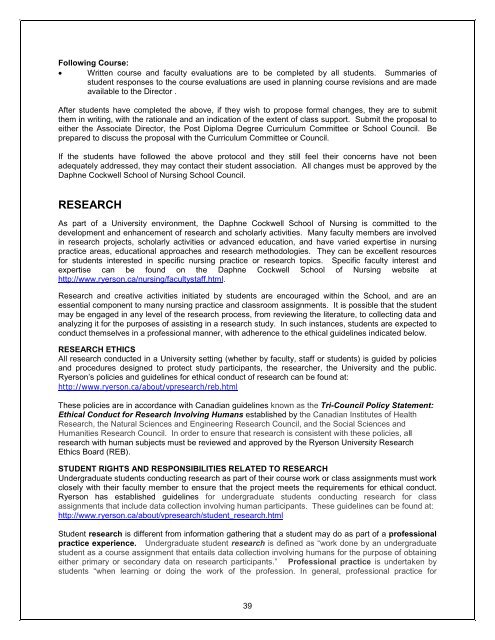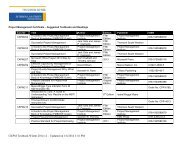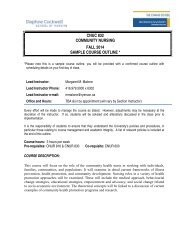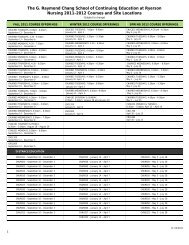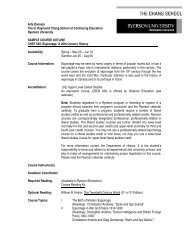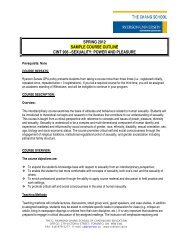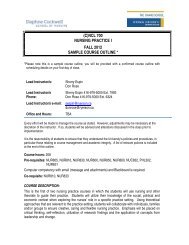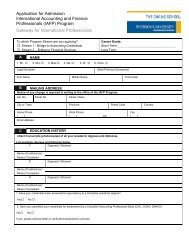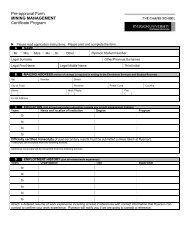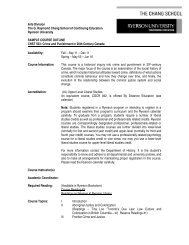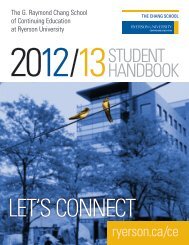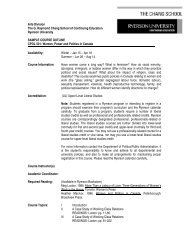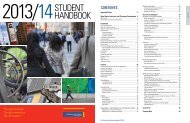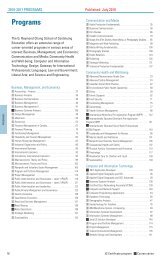School of Nursing - The Chang School - Ryerson University
School of Nursing - The Chang School - Ryerson University
School of Nursing - The Chang School - Ryerson University
Create successful ePaper yourself
Turn your PDF publications into a flip-book with our unique Google optimized e-Paper software.
Following Course:<br />
• Written course and faculty evaluations are to be completed by all students. Summaries <strong>of</strong><br />
student responses to the course evaluations are used in planning course revisions and are made<br />
available to the Director .<br />
After students have completed the above, if they wish to propose formal changes, they are to submit<br />
them in writing, with the rationale and an indication <strong>of</strong> the extent <strong>of</strong> class support. Submit the proposal to<br />
either the Associate Director, the Post Diploma Degree Curriculum Committee or <strong>School</strong> Council. Be<br />
prepared to discuss the proposal with the Curriculum Committee or Council.<br />
If the students have followed the above protocol and they still feel their concerns have not been<br />
adequately addressed, they may contact their student association. All changes must be approved by the<br />
Daphne Cockwell <strong>School</strong> <strong>of</strong> <strong>Nursing</strong> <strong>School</strong> Council.<br />
RESEARCH<br />
As part <strong>of</strong> a <strong>University</strong> environment, the Daphne Cockwell <strong>School</strong> <strong>of</strong> <strong>Nursing</strong> is committed to the<br />
development and enhancement <strong>of</strong> research and scholarly activities. Many faculty members are involved<br />
in research projects, scholarly activities or advanced education, and have varied expertise in nursing<br />
practice areas, educational approaches and research methodologies. <strong>The</strong>y can be excellent resources<br />
for students interested in specific nursing practice or research topics. Specific faculty interest and<br />
expertise can be found on the Daphne Cockwell <strong>School</strong> <strong>of</strong> <strong>Nursing</strong> website at<br />
http://www.ryerson.ca/nursing/facultystaff.html.<br />
Research and creative activities initiated by students are encouraged within the <strong>School</strong>, and are an<br />
essential component to many nursing practice and classroom assignments. It is possible that the student<br />
may be engaged in any level <strong>of</strong> the research process, from reviewing the literature, to collecting data and<br />
analyzing it for the purposes <strong>of</strong> assisting in a research study. In such instances, students are expected to<br />
conduct themselves in a pr<strong>of</strong>essional manner, with adherence to the ethical guidelines indicated below.<br />
RESEARCH ETHICS<br />
All research conducted in a <strong>University</strong> setting (whether by faculty, staff or students) is guided by policies<br />
and procedures designed to protect study participants, the researcher, the <strong>University</strong> and the public.<br />
<strong>Ryerson</strong>’s policies and guidelines for ethical conduct <strong>of</strong> research can be found at:<br />
http://www.ryerson.ca/about/vpresearch/reb.html<br />
<strong>The</strong>se policies are in accordance with Canadian guidelines known as the Tri-Council Policy Statement:<br />
Ethical Conduct for Research Involving Humans established by the Canadian Institutes <strong>of</strong> Health<br />
Research, the Natural Sciences and Engineering Research Council, and the Social Sciences and<br />
Humanities Research Council. In order to ensure that research is consistent with these policies, all<br />
research with human subjects must be reviewed and approved by the <strong>Ryerson</strong> <strong>University</strong> Research<br />
Ethics Board (REB).<br />
STUDENT RIGHTS AND RESPONSIBILITIES RELATED TO RESEARCH<br />
Undergraduate students conducting research as part <strong>of</strong> their course work or class assignments must work<br />
closely with their faculty member to ensure that the project meets the requirements for ethical conduct.<br />
<strong>Ryerson</strong> has established guidelines for undergraduate students conducting research for class<br />
assignments that include data collection involving human participants. <strong>The</strong>se guidelines can be found at:<br />
http://www.ryerson.ca/about/vpresearch/student_research.html<br />
Student research is different from information gathering that a student may do as part <strong>of</strong> a pr<strong>of</strong>essional<br />
practice experience. Undergraduate student research is defined as “work done by an undergraduate<br />
student as a course assignment that entails data collection involving humans for the purpose <strong>of</strong> obtaining<br />
either primary or secondary data on research participants.” Pr<strong>of</strong>essional practice is undertaken by<br />
students “when learning or doing the work <strong>of</strong> the pr<strong>of</strong>ession. In general, pr<strong>of</strong>essional practice for<br />
39


